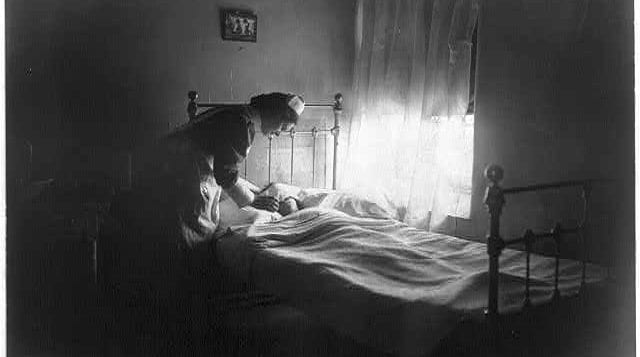Your Turn: Nurses at sea
By Nomi Dayan

Becoming ill is never fun. Becoming ill when away from home is worse. And becoming ill at sea on a whaling ship is the worst of all. “Let a man be sick anywhere else — but on shipboard,” wrote whaler Francis A. Olmstead in 1841 in “Incidents of a Whaling Voyage.”
Whalers who fell ill could find little comfort. Olmstead continued to explain, “When we are sick on shore, we obtain good medical advice, kind attention, quiet rest, and a well ventilated room. The invalid at sea can command but very few of these alleviations to his sufferings.” There were no “sick days” for whalers, who were expected to work during busy times if they could stand.
The incapacitated whaler would lie on his grimy, cramped straw mattress in his misery, listen to the nonstop creaking of the ship, roll from side to side with the swaying of the ship, and breathe the fishy, putrid air. He would eventually be visited by the “doctor,” a.k.a. the captain. The skipper would rely on his weak medical and surgical knowledge as he opened his medicine chest and offered some powdered rhubarb, a little buckthorn syrup, or perhaps mercurial ointment, chamomile flowers or cobalt. The whaler would then either recover or die. If he passed, the captain would casually mention his death in the next letter home, and perhaps pick up a replacement at the next port.
If the whaler was lucky, he might awaken from his burning fever and shivering chills to hear a soothing voice, feel a cool cloth being gently placed on his forehead, and perhaps taste a bit of food offered to him. He would sit up to catch a glimpse of this angel visiting him with her wide skirt and billowing sleeves.
She was none other than the captain’s wife. Women who lived on board whaling ships with their captain-husbands were primarily there to avoid the widow-like years ashore. Although these wives generally lived a profoundly separate life from the rest of the crew at sea, some wives recorded in their journals how they aided sick crew members as nurses. They wrote how they were bothered to see others suffer, and felt satisfied with their own usefulness in a situation where medical resources were bordering nonexistent.
Even if there was not much she could accomplish medically for a sick or hurt whaler, it seems her presence alone could be a comfort to men: Olmstead lamented that the attention an ill man received from other men “have none of that soothing influence which woman’s tender sympathy alone can impart.”
Mary Brewster, who sailed from Connecticut in 1845, observed that “a whaleship is a hard place for comfort for well ones and much more sick men.” She documented in her journal how “the best part of the day I have spent in making doses for the sick and dressing sore hands and feet. 5 sick and I am sent to for all the medicin[e]. I am willing to do what can be done for any one particularly if sick.”
Another wife of a coastal trader, Mary Satterly Rowland of Setauket, reported an unending job tending maladies and injuries: “First came Jack, a dose of salts. Second case Nick with a sore leg knocked off the skin on launching day. Thirdly Gardner taken cold and confined to the forecastle several days. Fourth, Cook Rheumatic pain and in bed sick … Fifth case Lawrence cut his toe.”
Martha Brown of Orient also played nurse at sea to an unfortunate young man, John. “I went into steerage this afternoon to give him some medicine, and asked him how he felt. His answer was ‘Mrs. Brown, I feel bad.’ My heart was touched. It is very hard to see him gradually growing worse and can do nothing for him.” One can imagine Martha’s grief watching him die shortly after. He was buried at sea.
One whaling wife’s experience as a nurse led her to falling in love with her patient. When 29-year-old first officer Will Williams was badly injured, Elizabeth Stetson nursed him all night, and continued to visit him when he was hospitalized. She washed his hair, cleaned his nails, and chatted – and chatted – and chatted, growing emotionally closer to him until she admitted in her diary, “I hope that Charles [husband] does not mind if I do love Willie so much.” Once he recovered, though, and rejoined the ship months later, she continued to get to know him – and his faults – and the spell was broken.
Most wives were happy to feel valuable and help contribute to the voyage’s success. Some took the initiative to go beyond their nursing roles: Calista Stover of Maine persuaded the crew of a sailing ship to swear off tobacco and alcohol while in port (the pledge didn’t stick). Others tried to reform men’s swearing. However, women tried to improve the crew, their support gives understanding to the root of the word “nurse,” which is Latin for “nutrire” – nourish. No wonder Charles. W. Morgan wrote, “There is more decency on board when there is a woman.”
Nomi Dayan is the executive director of The Whaling Museum of Cold Spring Harbor. In honor of National Nurses Week, the museum is offering pay-as-you-wish admission for nurses (with current ID) and their families (up to 6 people) from May 7 to 12, as the museum recognizes the importance of nursing roles which whaling wives often took in the whaling industry.







